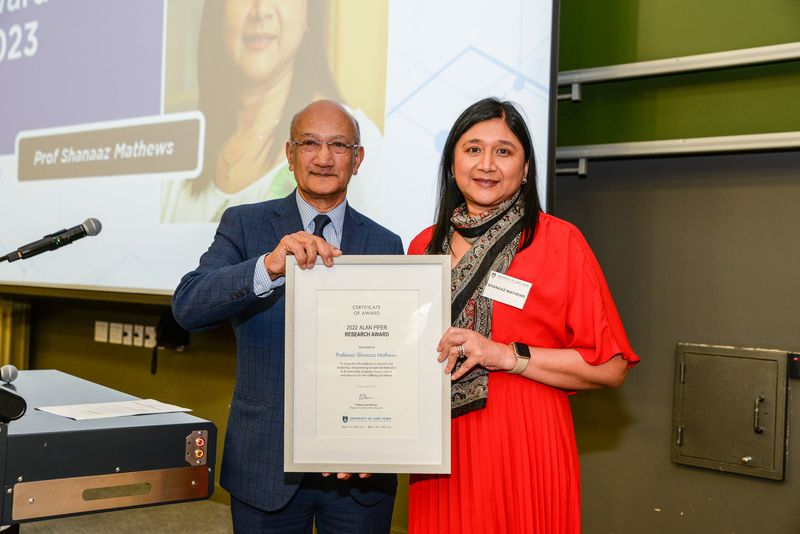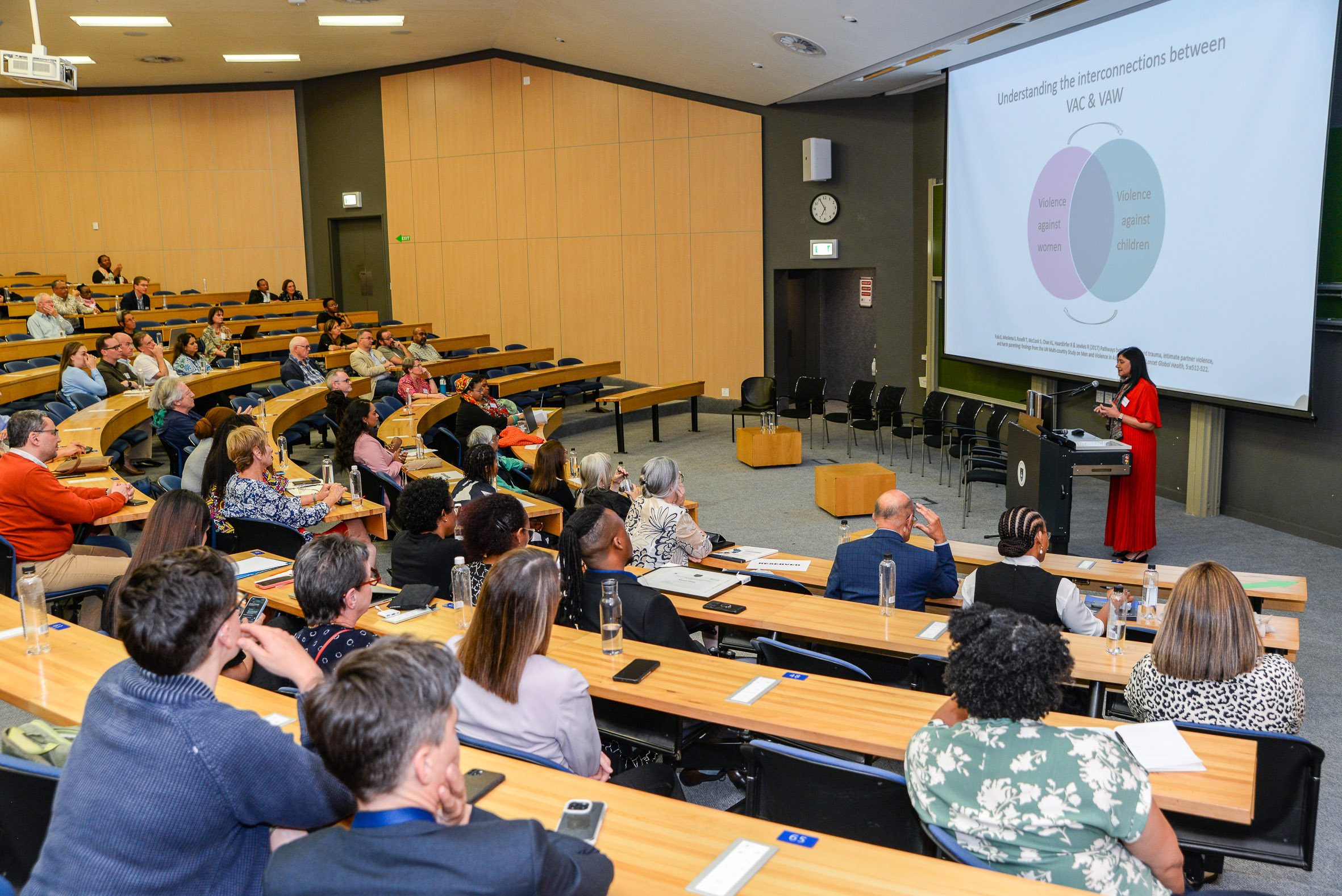‘Accidental academic’ Prof Shanaaz Mathews wins 2022 Alan Pifer Award
20 December 2023 | Story Paul Lawrence. Photo Robin Thuynsma. Read time 7 min.
Recognising her extensive work in violence prevention, particularly, the interconnectedness of violence against women and children the University of Cape Town (UCT) honoured Professor Shanaaz Mathews with the 2022 Alan Pifer Award. Professor Mathews combines academic excellence with dogged determination and a deep-rooted commitment to social justice.
The award is the vice-chancellor’s annual prize in recognition of outstanding welfare-related research. The prize was created to commemorate a longstanding benefactor of UCT, Alan Pifer, a noted philanthropist and past president of the Carnegie Corporation. Pifer’s career was marked by a commitment to social justice and the empowerment of historically marginalised groups, with a particular emphasis on women’s rights.
Mathews describes herself as an ‘accidental academic’. She recalls that her high school and university years were shaped by anti-apartheid politics and student activism. Trained as a social worker she practiced at the Red Cross War Memorial Children’s Hospital for 10 years. Her clinical work was focused mainly on working with survivors of child sexual abuse and providing children and their families with therapeutic support to facilitate recovery after enduring sexual abuse.
When South Africa was transitioning into a new era of democracy in 1994, Mathews too was shifting focus. She found herself managing a project that worked on establishing a network on violence against women with a focus on influencing the formulation of the Domestic Violence Act of 1998. She conducted research into the budget allocation for the act and was invited to present the research findings at the United Nations Women’s Conference in 2000 in New York.
At this point Mathews experienced an epiphany. The experience “made me understand the power rigorous research has to influence policy with the potential to change the lives of women and children in communities.”
She went on to register for a PhD, the topic of which was intimate femicide, the killing of a woman by her intimate partner, while at the South African Medical Research Council (SAMRC).
Influencing policy and shaping lives
Mathews’ work has had a tangible impact on policy and legislation. As the lead researcher exploring the determinants of violence against women and children for the Interministerial Committee in 2016, her findings laid the groundwork for the National Strategic Plan on Gender-Based Violence (GBV) and femicide. The plan was adopted in 2020 as a society-wide programme with the aim of ending GBV and femicide.
Her achievements at The Children’s Institute (CI), where she served as director for over a decade, are particularly noteworthy. Her research combined with advocacy led to a landmark judgment in 2019 by the Constitutional Court, declaring corporal punishment in homes unconstitutional.
“I found that achieving policy and legislative reform is often a slow and challenging process,” Mathews said, reflecting on this process.
She is a commissioner on the Lancet Commission on GBV and is leading a country-wide case study bringing together the epidemiology of violence against women and violence against children and its economic impact, while also exploring how social movements have influenced GBV policy in South Africa.
In August 2023 she won the Mail and Guardian – Power of Women under The Governing Woman category. This was a recognition of the contribution of her work towards ending violence against women and children.
“To reduce violence against vulnerable groups we must take intervention to scale.”
She also serves on an advisory board for the United Nations International Children’s Emergency Fund (UNICEF) Office of Research-Innocenti multi-country study on drivers of violence against children.
The Alan Pifer Award recognises research which has demonstrated impact on, and relevance to, the advancement and welfare of South Africa’s disadvantaged people. At the Research Celebration where Mathews received the award, she spoke how her research has been tracking femicide statistics in South Africa for over 20 years and that the last wave of data collection done in 2017 showed a decline for the first time, underscoring the effectiveness of advocacy efforts in influencing policy.
In her acceptance speech she cautioned against complacency, warning that: “Violence against women and violence against children share common risk factors and are underpinned by the same societal norms which drive an intergenerational cycle of violence. To reduce violence against vulnerable groups we must take intervention to scale.”
The professor emphasized the need to maintain essential funding and support to sustain a research agenda focused on curtailing violence against women and children.

Current research and work
Mathews’ current research integrates an intersectional feminist framework which considers that male power is predicated on the subordination of family members (women and children).
She argues that: “Based on this framework, we come to understand that if programmes are to succeed, they need to keep women and children at their centre. To be transformative you must work in partnership with local women’s organisations to improve resources, legislation and services to prevent and respond to violence against women.”
“If programmes are to succeed, they need to keep women and children at their centre.”
Mathews is part of the What Works II Research consortium, a seven-year programme funded by the Foreign, Commonwealth and Development Office to further the evidence base of ‘what works’ to prevent violence against women and children at scale. UCT, through her involvement in the consortium, is playing a leading role in the 25-million-pound research programme funded through the United Kingdom government.
A legacy of impact
As she looks forward, the Faculty of Health Sciences professor emphasises the importance of effectively scaling up violence prevention programs without compromising their efficacy and identifying interventions that work in diverse contexts. When asked about what impact the recognition would have on her work she replied, “This award is an acknowledgement of the importance of research into violence against women and children as a significant challenge that limits women’s and children’s rights to safety and gender equality, inter alia – a significant problem with long-term intergenerational consequences.”
She re-iterated her determination to create a legacy of research excellence, “I am passionate about growing a cohort of young researchers to understand the methods and ethics underpinning violence prevention research.”
Mathews continues to inspire and mentor the next generation of researchers with her academic rigor, policy influence and commitment to rights-based approaches.
 This work is licensed under a Creative Commons Attribution-NoDerivatives 4.0 International License.
This work is licensed under a Creative Commons Attribution-NoDerivatives 4.0 International License.
Please view the republishing articles page for more information.
Research & innovation





































